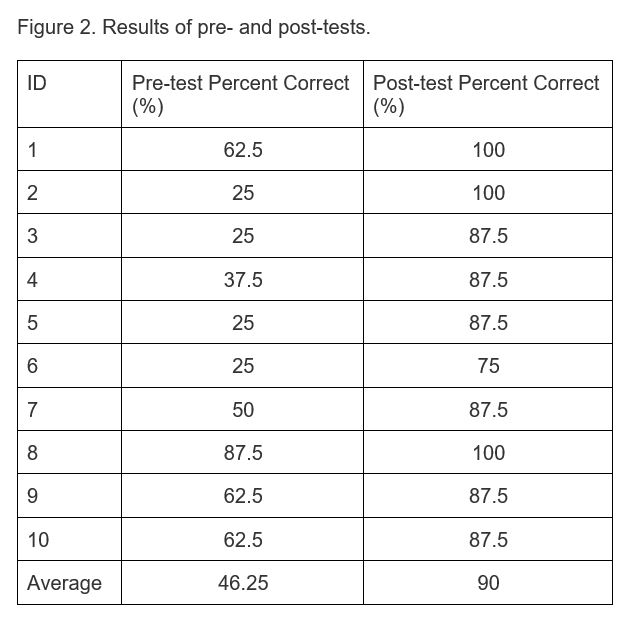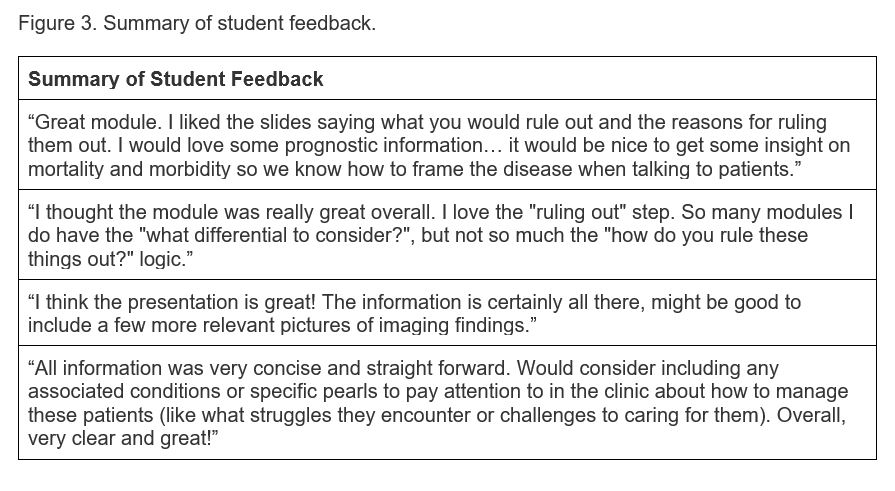Session Information
Date: Monday, November 9, 2020
Session Type: Poster Session D
Session Time: 9:00AM-11:00AM
Background/Purpose: Sarcoidosis is a systemic, multi-organ disease frequently overlooked in the development of a differential diagnosis. Although typically considered a pulmonary disease, management decisions often fall to the Rheumatologist especially in the context of sarcoid-related arthritis or the initiation of immunosuppressive therapy. We sought to create an interactive module to train internal medicine residents and medical students in the diagnosis and management ofmusculoskeletal sarcoidosis. This module is a part of a larger module-based Rheumatology curriculum undergoing development at Virginia Commonwealth University School of Medicine (VCU SOM). Our goal is to assess whether this module improves internal medicine trainee’s understanding of musculoskeletal sarcoidosis.
Methods: This study was internally conducted at VCUSOM. We developed a module with a pre- and post-test focused on the varying presentations of musculoskeletal sarcoidosis. The module was based on a clinical case presentation to allow trainees to demonstrate their ability to obtain a thorough history and physical exam, order appropriate labs and imaging, create an appropriate differential diagnosis for musculoskeletal sarcoidosis, and reach an accurate final diagnosis. The module progresses to cover treatment options and reviews the different subtypes of musculoskeletal sarcoidosis, ultimately covering joint, muscular, and osseous sarcoid presentations. Internal medicine residents and medical students were asked to complete our module. The pre-test was done immediately prior to the module and the post-test immediately following completion of the module. The test included eight questions evaluating knowledge of the varying clinical presentations, features, and treatment of musculoskeletal sarcoidosis. The questions are included in Figure 1. Data was collected and stored on a secure cloud-based program, REDCap, and then analyzed using the students’ t-test.
Results: The module was tested by nine medical students and one fellow at VCU SOM. We observed a significant difference between the percentage correct for the pre- and post-tests (Figure 2), from an average of 46.25% to 90% (P-Value = < 0.001). Feedback was consistently positive and the comments are summarized in Figure 3.
Conclusion: Our pilot study suggests that integrating a sarcoidosis module within the internal medicine residency curriculum and the pre-clinical medical student curriculum may result in improved knowledge and recognition of musculoskeletal sarcoidosis. We plan to continue to recruit medical trainees to participate in our module, which serves as a portion of the larger virtual curriculum that we are building at the VCU SOM for didactics in rheumatology. We hope in future studies to evaluate a larger sample size and evaluate trainees for long term retention of knowledge gained through this module.
 Figure 1. Pre- and post-test questionnaire.
Figure 1. Pre- and post-test questionnaire.
 Figure 2. Results of pre- and post-tests.
Figure 2. Results of pre- and post-tests.
 Figure 3. Summary of student feedback.
Figure 3. Summary of student feedback.
To cite this abstract in AMA style:
Fadel K, Dombrosky E, Syed H, Gavin J, Nandan A, Danielides S, Rubinstein B, KC Y, Johnson S. Musculoskeletal Sarcoidosis Learning Module for Internal Medicine Trainees: Developing a Rheumatology Curriculum [abstract]. Arthritis Rheumatol. 2020; 72 (suppl 10). https://acrabstracts.org/abstract/musculoskeletal-sarcoidosis-learning-module-for-internal-medicine-trainees-developing-a-rheumatology-curriculum/. Accessed .« Back to ACR Convergence 2020
ACR Meeting Abstracts - https://acrabstracts.org/abstract/musculoskeletal-sarcoidosis-learning-module-for-internal-medicine-trainees-developing-a-rheumatology-curriculum/
